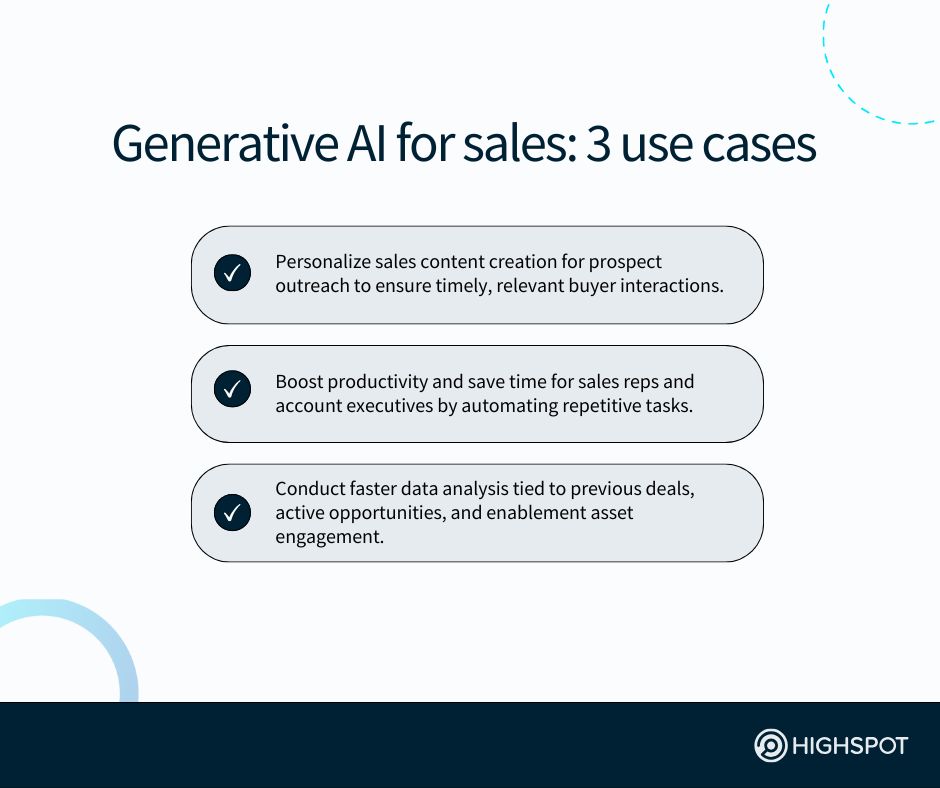Key Takeaways
- Leveraging generative AI for sales helps go-to-market (GTM) teams at B2B companies across industries reactively respond to customer behavior and proactively plan enablement programs and sales plays.
- GenAI isn’t a panacea for your enablement, marketing, or sales teams, but, when the optimal AI tools are onboarded and GTM teams fully adopt them, it can be a sustainable driver of near- and long-term sales growth.
- Sales reps at enterprise organizations continue to become more AI-savvy, using the emerging technology to build stronger customer relationships, understand issues with their prospecting, and close deals faster.
If you’re like most sales leaders at large B2B organizations today, you’re juggling a thousand things at once—hitting your numbers, onboarding new reps, coaching your team, and rolling out the latest go-to-market motion or initiative.
And somewhere in the middle of all that? You’re supposed to be leading with insight, executing flawlessly, and finding time to think and plan more strategically.
That’s where generative AI for sales can ease the burden and workload for you and your sellers—and help you realize a much more scalable and efficient sales process.
Why use generative AI for sales?
Forget the broad hype around artificial intelligence at large for just a second.
Think about what the best AI sales tools present offer your reps specifically.
This isn’t about robots replacing sellers or flashy demos that go nowhere. GenAI is really about giving your sales team real leverage in conversations with potential customers.
More to the point, the kind of leverage that makes your sales reps sharper, your sales managers more impactful, and your entire revenue engine run smoother (as one team).
Imagine you’re about to launch a new product.
- Instead of scrambling to craft compelling sales collateral from scratch, you’ve got generative AI tools helping to both curate and create content that’s on-message and tailored for each buyer persona.
- Your sales managers? They’re no longer buried in spreadsheets and busywork. Instead, they’re analyzing data and insights served up to them by AI sales agents that connect to reps’ real-time behavior.
- Meanwhile, your sales reps are walking into calls with potential customers more confident, as they’ve got AI-powered coaching incorporated in their workflow—not another training course, but actual support.
And that’s just the start.
Securing customer feedback, automating repetitive tasks, and resurfacing historical sales data and customer insights are just some of the common generative-AI-for-sales use cases you’ll find at mid-sized and enterprise companies today.
As a sales leader, investing in generative AI isn’t about chasing a trend. It’s about unlocking time, clarity, and consistency—so your team can perform at a higher level.
The state of generative AI in sales operations
It’s clear GenAI has the potential to transform your go-to-market strategy for the better.
That said, the technology only works if you pick the right tools and roll them out effectively so your reps, marketers, and enablement personnel actually use it.
But that’s not all you need to do.
As Highspot’s GTM Performance Gap Report discovered, generative AI tools (and other tried-and-tested AI solutions) must be deeply implanted in day-to-day operations for them to drive sales performance improvements.
Otherwise, your go-to-market team could end up facing AI adoption and implementation issues like those at similar organizations have experienced.
For instance, our report found just 28% of GTM leaders said AI is improving their sales performance and driving efficiencies across their sales teams.
There are a few reasons we discovered as to why generative AI has such low adoption in these GTM leaders’ sales, marketing, enablement, and revenue operations to date:
Apprehension about generative AI tools at large
Generative AI still feels like a black box to many GTM leaders—full of promise, but fuzzy on how it actually works in a sales context: writing sales scripts, analyzing market trends, assisting sales teams with manual tasks, and the like.
With news cycles dominated by ethical debates and misuse fears, it’s easy to lump all AI sales tools into one risky, experimental category.
But not all GenAI is created equal.
And this hesitation to embrace generative AI for sales can actually block capitalizing on technology that is purpose-built to help them, not replace them.
Lack of trust in generative AI sales technologies
Many go-to-market leaders also worry generative AI will spit out inaccurate messaging, suggest irrelevant actions, or give their sales representatives advice that doesn’t truly reflect the real buyer journey across the sales funnel.
This fear often stems from early AI vendors that prioritized flash over precision (likely to boost their own sales) and failed to build trust with revenue teams.
Modern GTM performance platforms like Highspot, though, have proven that, when AI is grounded in your data and workflows, it becomes a reliable driver of performance.
Not a liability.
Misalignment regarding ownership and utilization
Some marketing teams think enablement should own generative AI tools. Meanwhile, enablement often thinks sales should manage them, and sales reps just want the solutions to work in the background without adding more noise.
That internal tug-of-war creates paralysis, with no one feeling empowered to activate or measure GenAI’s impact on go-to-market operations.
In reality, shared ownership paired with clear use cases unlocks cross-functional alignment—and the performance lift GTM leaders like you are ultimately responsible for.

How to use generative AI for sales success
For sales, generative AI offers a lot of untapped potential and new opportunities for growth.
But before you buy the latest and greatest AI solutions for your sales professionals (and other GTM teams), it’s worth knowing the core use cases, like:
Personalizing content creation for better customer interactions
You want your sales professionals on your team to bring the right message to every buyer—but too often, content creation becomes a time-consuming bottleneck.
Reps scramble to update pitch decks, refresh email templates, or develop messaging based on guesswork, not customer data. With generative AI for sales, that changes.
Highspot’s AutoDocs can take the legwork out of tailoring materials, enabling your sales and marketing teams to produce compliant, on-brand, personalized assets with just a few clicks.
Whether you’re customizing value decks for industry-specific deals or building follow-up materials tied to a recent demo, our AI makes content creation fast and focused.
Specifically, AutoDocs enables sales team members to:
- Generate bespoke decks based on past interactions in mere seconds
- Tailor all sales collateral by persona, stage, or segment—automatically
- Ensure enablement content is brand-compliant and always up-to-date
With your sales reps’ time and operational costs always top of mind with you and other GTM leaders, taking advantage of generative AI functionality like this to automate tasks is the fastest way to ensure more personalized customer interactions at scale.
And free up time for what really matters: selling.
Boosting sales productivity for your reps and account executives
Well-crafted sales strategies and methodologies are useless if they’re not fully adopted and your reps know how to apply a given playbook to opportunities in their sales pipeline.
That’s where AI-powered sales training and coaching—the kind that reinforces good behaviors in sales reps and aids them with advancing and closing deals—can help.
Generative AI in sales can enable you and other go-to-market leaders to equip and guide your reps in real time. Take Highspot’s AI-driven sales coaching tools.
Our GTM platform give reps receive contextual feedback based on sales calls, role-play scenarios, and learning paths tailored to their experience level and performance data.
Instead of relying on one-off training sessions, your sales reps get continuous development that sticks—coaching feedback that factors in real chats with prospects, allowing sales team members to grow with each successive deal.
In short, this reduces friction in the sales cycle and empowers reps—particularly new sales professionals on your staff—to level-up faster and improve every day.
Conducting data analysis tied to deals and customer experience
It’s one thing to track clicks and views. It’s another to generate actionable insights that drive revenue. Today, B2B sales data analysis needs to go beyond dashboards—it should connect the dots between rep behavior, buyer response, and revenue outcomes.
Enter Highspot’s suite of generative AI-powered agents.
Synced with Salesforce instance and seamlessly integrated in your GTM stack, Highspot Agents guide your sales and marketing teams with insights tied to leads’ engagement activity, customer sentiment analysis, and performance across sales strategy initiatives.
Whether you’re looking at historical data or live interactions, our AI agents help you see what’s working with your enablement, marketing, and sales efforts—and act on it:
- Identify winning behaviors by top performers: Get real-time deal guidance and next-best actions, based on buyer signals and latest sales activity.
- Spot sales content and GTM campaign impact: Surface high-impact content insights and campaign performance to tie them to revenue outcomes.
- Pinpoint team adoption gaps with insights: Flag adoption gaps, skill trends, and initiative alignment to coach, train, and guide reps effectively.
This is how you move from gut feel to precision execution: Use your wealth of customer data to evolve and adapt your sales processes and, in turn, realize better sales outcomes and greater revenue growth for your business.
What to look for in generative AI sales tools
Keeping tabs on market trends and how other large companies capitalize on generative AI for sales can certainly help you and other financial and tech decision-makers at your organization understand what the top tools move the needle today.
That said, factoring in your own business needs and goals is what should ultimately inform your search for the ideal AI-powered sales tools for your team of sales professionals.
Some best practices for carrying out intentional and focused AI research include:
Investing in a unified, centralized AI solution for everyone in GTM
This one’s a no-brainer.
Siloed tools that don’t ‘speak’ to one another are the death of go-to-market progress. Think about it: How much time do your sales professionals, product marketers, and enablement staff spend moving from one system to another in their typical workday?
Having a single source of truth GTM enablement platform with native AI capabilities and robust analytics tied to shared activities across teams is now vital.
Seeking proven artificial intelligence capabilities and integrations
The goal with using AI for sales is to realize better customer interactions that lead to stronger customer relationships—not just automate tasks for automation’s sake.
Your sales team needs AI that elevates customer satisfaction, not just their own productivity.
Direct integration with your CRM system and other GTM tech (conversation intelligence tools, buyer engagement solutions) is essential, as it enables generative AI to lean on the most accurate and timely data that flows back and forth among these data-driven technologies.
Finding tools that aid with lead generation and sales prospecting
Speaking of integrations, an interconnected GTM tech ecosystem doesn’t just mean onboarding cutting-edge sales tools. It also means providing marketing and enablement with platforms that aid with generating new leads and sending audience engagement data straight to your CRM to inform reps’ sales prospecting.
Your sales professionals control only so much, when it comes to deal velocity.
Having reliable, easily accessible data tied to new leads—like when they become qualified—means more timely outreach and the ability to leverage AI capabilities that can put together custom-tailored pitch decks more quickly.
Identifying accurate sales forecasting tools that blend sales data
Sales growth is entirely dependent on you and other GTM leaders’ sales forecasting abilities. If you realize this interconnected tech stack, that means analyzing data tied to recent and ongoing deals can be put on relative autopilot.
The ideal generative AI tools look at data tied to personalized customer interactions, how prospects engage with sales collateral, sentiment analysis among leads, and what content and messaging influences deal momentum and revenue.
Why AI tools are essential for GTM success
Our Go-to-Market Performance Gap Report, while showing plenty of room for improvement and opportunity areas for go-to-market teams across the globe, also painted a picture of business leaders who are eager to use generative AI for sales:
Case in point: Those surveyed recognize their teams need:
- AI-powered recommendations for next-best actions (26%)
- More actionable data and performance insights for their reps (17%)
- Always-on coaching and readiness support for sales team members (10%)
These sales, marketing, and revenue leaders just need a roadmap to implement their AI strategy and elevate their AI maturity. First, though, they need the right AI tools.
Notably, ones that not only offer predictive analytics, improve key sales metrics, and streamline daily work for reps and lead to more impactful sales interactions.




